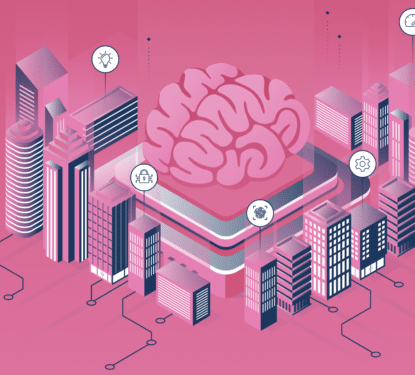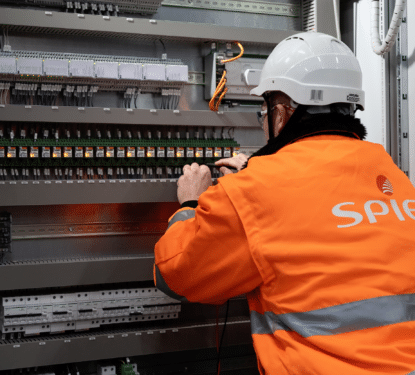“General hygiene expectations of employees have risen significantly, and facilities services providers are under pressure to maintain rigorous sanitation regimes, especially in common areas. Adopting rigorous cleaning routines remains paramount to maintaining building occupant confidence,” reads our recent study on the IoT in smart commercial buildings. “The COVID-19 pandemic has elicited significant changes to working practices in buildings of all kinds related to hygiene, health, and safety. Some of these changes will only persist while the virus remains a threat, others are likely to be more long term.”
Effective mitigation of virus-related risks in buildings during the pandemic involved revisions to multiple building practices, including cleaning regimes, security systems and procedures, air quality, & HVAC configurations, workplace safety, and food preparation. Employees now expect provision of hand sanitizers at building entrances and in communal areas as well as disinfectant wipes for use on desks, cash registers or other devices such as coffee machines. Whether building occupants use the hand sanitizer or not, its presence has come to symbolize the building’s safe attitude towards hygiene, while its absence raises suspicion on the building’s cleanliness.
Research conducted by Kimberly-Clark Professional at the height of the pandemic helps to highlight these changing expectations. The survey found that the most important factors that building users use to gauge the safety in a building included 69% wanting strict social distancing policies enforcement, 70% who cited the provision of hygienic hand washing and toilet facilities, and 62% saying that seeing cleaning in action was important. Hygiene was an important part of facilities management before the pandemic and most people would have preferred a cleaner building at any stage in history, but COVID and the shift to remote work has raised the acceptable standard and given employees the position to demand it.
“The wellness movement was immature and underdeveloped before the COVID-19 pandemic, with only a limited number of organizations actively investing in health & wellness initiatives to help recruit and retain the best talent. However, interest in the domain has been supercharged over the last 24 months due to the impact of the pandemic on behaviors and expectations,” reads our new research report. “Providing assurance and outward visual demonstration of the measures being taken by building owners and managers to maintain healthy environments has been critical to enticing back wary returnees to commercial building of all kinds.”

Making the important virus hygiene upgrades in a building is not enough to support the return to work, staff retention, and attract new talent in the new building health landscape, facilities must also inform workers to build their “health confidence” in the space. In response to that growing demand from buildings, the sector’s certification agencies have revised their health and wellbeing standards to account for social distancing procedures, people counting for limiting occupancy, virus-specific air quality, and many other health topics raised by the pandemic.
The RESET standard is currently developing a Viral Index which calculates the potential for infection based on the indoor air quality metrics that can be controlled by a building's or indoor space's air system and expresses it in one score number. Fitwel, meanwhile, created the Viral Response Module (VRM)224 to set the global standard for safeguarding occupant health and wellness, offering a strong evidence-based, third-party certification to mitigate viral transmission in buildings. While future revisions may reduce the weight of some virus-specific metrics, the investments made to develop these standards suggest building certifiers don’t see that happening very soon and even see the long-term demand for virus health in buildings.
A new version of the WELL Performance Rating was launched in July 2021, giving greater rewards to building owners and operators that use measurable and validated building and human performance metrics to gain insights into occupant health and well-being for indoor spaces. Finally, the IMMUNE Building Standard, from the Healthy by Design Building Institute (HDBI) in Brussels, is an evidence-based, third-party certified rating for the built environment, developed in 2020, specifically in response to the COVID-19 pandemic.
“IMMUNE is focused on providing building operators with the tools and strategy to monitor, communicate and adjust the health of the indoor physical space, with an efficient response protocol in case of viral, bacteriological, or toxicological events. It is based on the institute term a “Healthy by Design System”, which incorporates a network of specialized sensors that measure the indoor environment parameters such as air, humidity, temperature, or CO2 levels,” reads our in-depth report. “Data on the building’s performance is collected in real time, empowering the building operator to verify and adjust the condition of the building to a healthy performance level, providing occupants with the space and confidence for a healthy living experience.”
COVID is creating real and long-lasting changes but it wouldn’t be the first time that disease reshaped our built environment. Improvements in potable water distribution, wastewater extraction, air ventilation, insulation, entry procedures, and all manner of standard building materials, have all come about in reaction to health and safety crises. The bubonic plague sparked building improvements that reduced contact between rodents and humans, cholera improved the separation of potable and wastewater, each major outbreak serving as a growing motivator to reshape buildings for the good of their occupants and society as a whole.
“Out of adversity comes opportunity” – Benjamin Franklin



